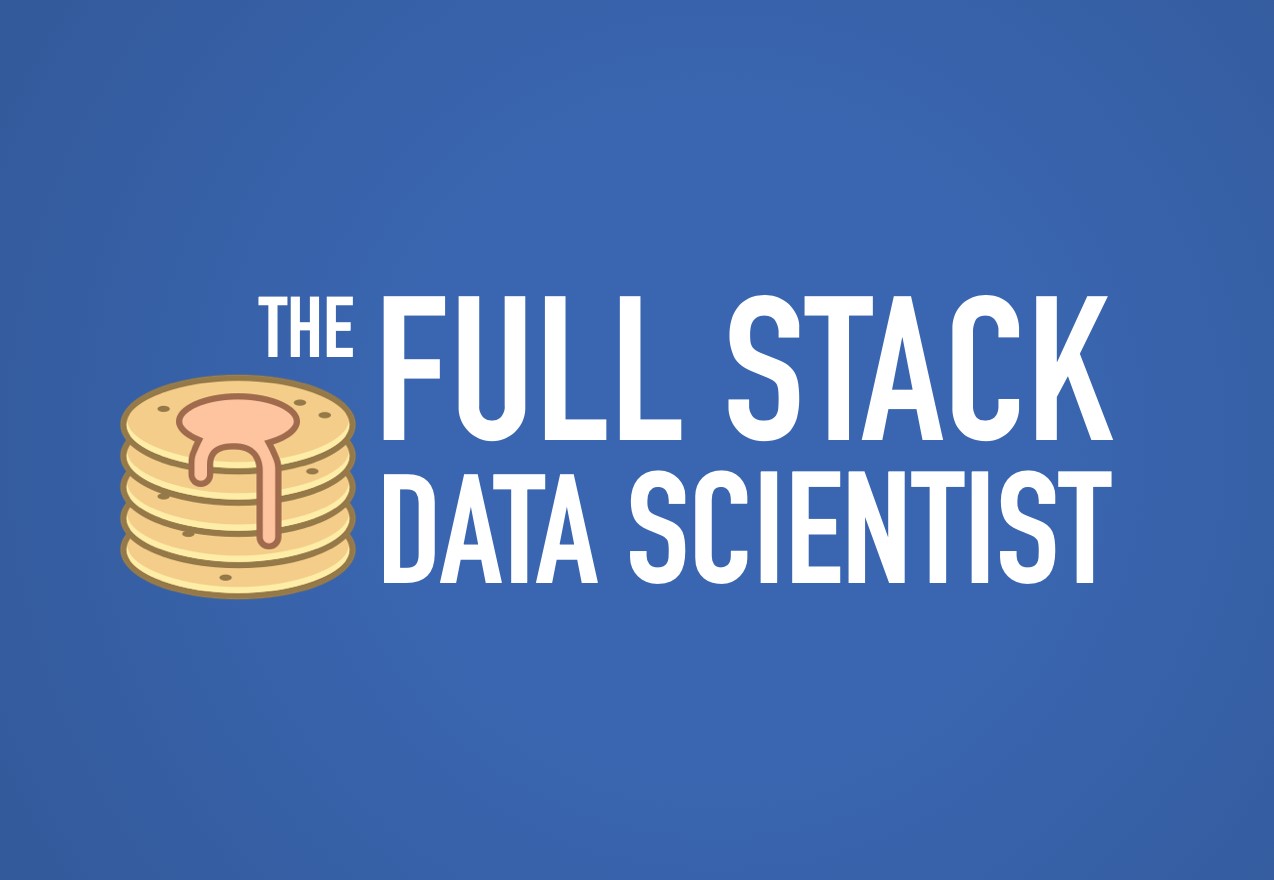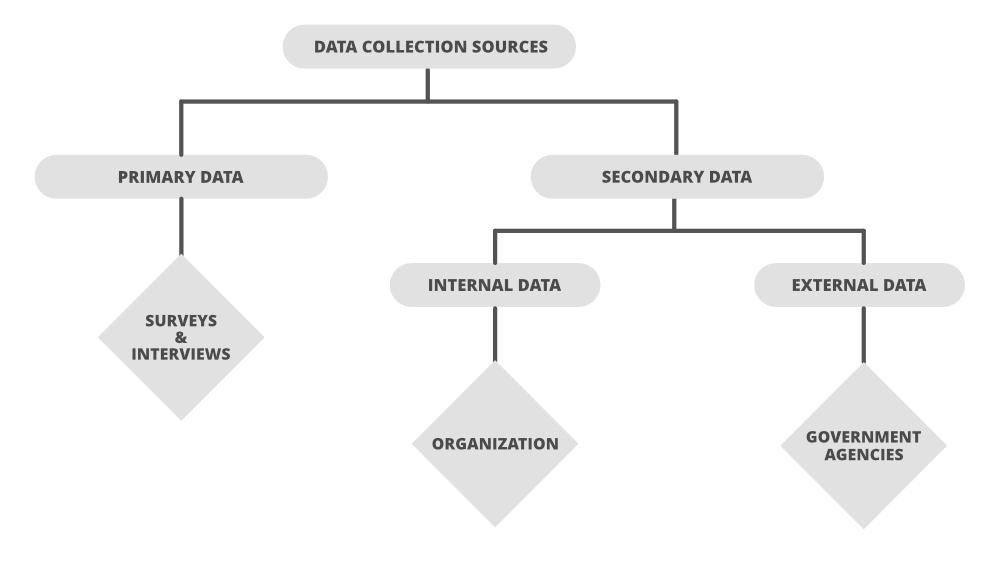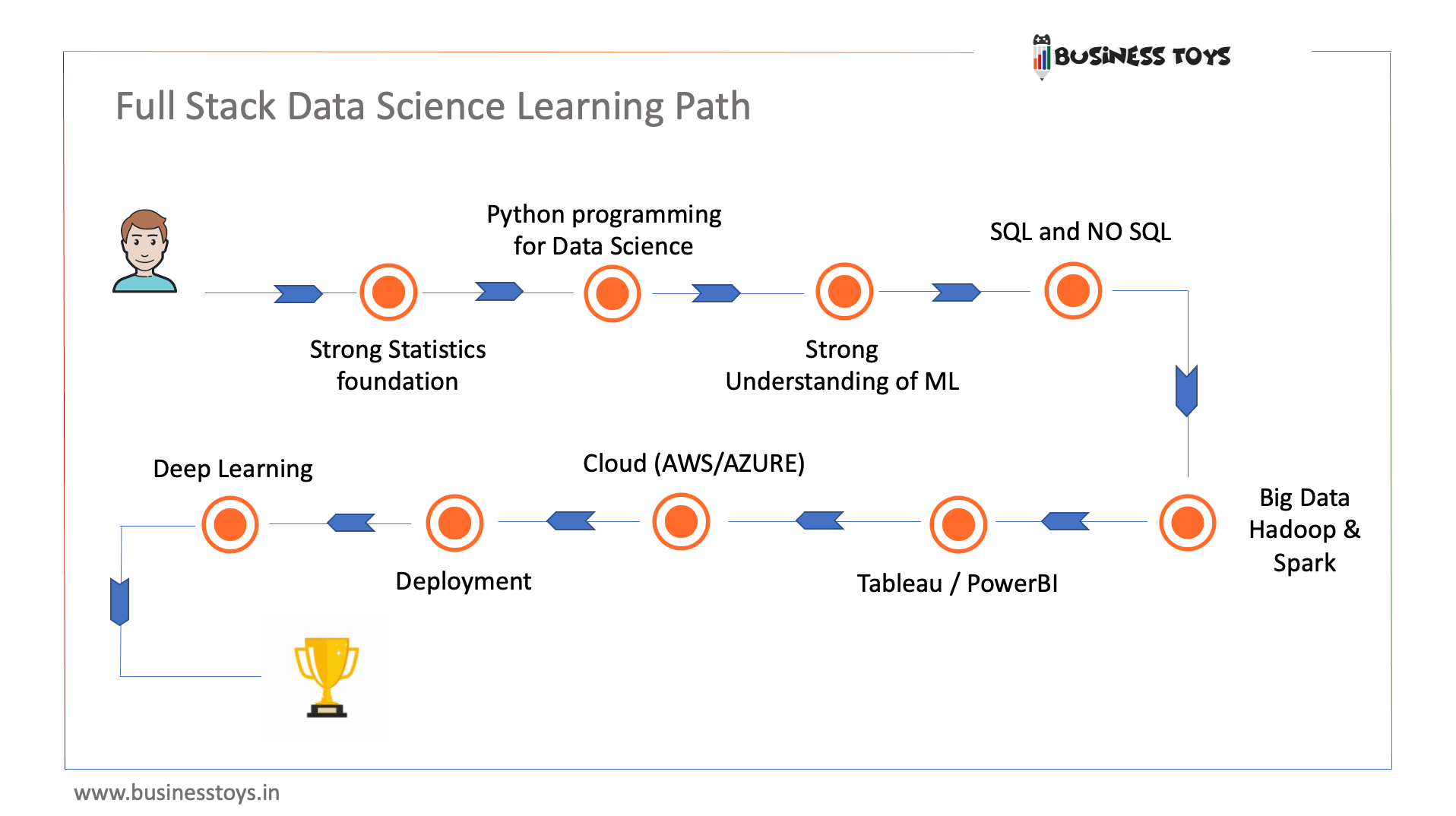What is Full Stack Data Science ?
Definition
Can the 'specialists' be Full Stack Data Scientists?
Skills required in the Full Stack Data Science Job
-
Identify the Business Problem
-
Understanding In-Scope Operation
-
Identify and Collect Data from New Sources
-
Learning path for Full Stack Data Science

If you are looking for an entry-level job in data science, you might have heard the profile 'Full-Stack Data Scientist'. Similarly, you might have read the name Full Stack Data Science while scrolling for certificate courses in data science. You might be wondering what it means. What does Full-Stack signify?
So what does a Full-Stack Data Scientist do? Is he in charge of everything right from the ideation process to implementation? Or is he like a director to the whole process? The profile is surely in demand. What can you do to become one? Let's find out.
Definition
Full-Stack Data Science is a job in the field of data science where you have to take a data-driven concept and take care of everything from the ideation to the implementation part. Of course, you don't have to do this without a team but you'll have to be in charge of the whole process. Your end goal should be to drive the organisation to do something with the analysis of the data.
It would be your responsibility to not just analyze data but bring it to a result that leads to some measurable improvement and change in the business. It's similar to a full stack developer who typically takes care of all the technical process in development.
The full-stack term comes with the responsibility of being able to deliver something tangible to the stakeholders. Now the profile isn't limited to just being able to develop a machine learning model for a business process.
No matter how sophisticated that model is, it would mean nothing if it doesn't deliver tangible results to the company. You may be technically and academically sound in the field but it could mean nothing if your model doesn't come to use in your business.
The concept of Full-Stack Data Science is all about understanding the business and marketing needs and developing machine learning models based on that. It's about adapting your activities to achieve a larger goal for the business.
So can the 'specialists' be Full-Stack Data Scientists ?
Now that you have got a little bit of understanding of the concept, you might be wondering if you want to give full-stack data science a try. You might think it's a risky proposition to try and become an expert or in charge of it all at once.

Of course even as far as data science has come in recent years, the predominant task still includes organization, collection and cleaning of data. Some of the data scientists perhaps want to just complete one part of the process and leave it all for others to do. Employees are often happy doing their bit and not taking up the responsibility for the result
But in such a case you are just completing one part and expecting it to contribute to the full stack. These specialists aren't actually creating anything but getting on with the job. You can learn to deploy skills and assets available to you but that doesn't make you a specialist.
Full-Stack Data Scientists instead can also develop advanced models using various published tools and then use them to the company's advantage. Being a full-stack data scientist is perhaps the foundational stone before you can go on to become a specialist. You need to have broad general credentials before carving a niche where you specialise.
And you would then be able to constantly push all your competitors too. You will always be breathing under the noses because you are good enough to do a variety of tasks and relate it to the business part of things
Skills required in the Full Stack Data Science Job
Although it does seem cliched, but being a full-stack data scientist is an exhausting and demanding job where you need to relish the challenges to thrive. To execute the data science business initiative from start to end you must learn the following skills:
- Identify the Business Problem
Fishing is not the way to go in data science. You might try your hand finding an interesting in a large stack of data but more often than not it will be a frustrating and failed attempt for stakeholders and data science teams. You need to identify the problem before looking for a solution.
More or less all data science ventures are focused on improving one or more of the 3 core operations that are improving service quality, maximizing efficiency and mitigating risks.
The conversation between the stakeholders and a Full-Stack Data Scientist revolves around impacting one of these. The initial planning can then help you identify the way forward as a full-stack data scientist. Technical assets and capabilities will then help achieve measurable success in these operations.
- Understanding In-Scope Operation
As a data scientist, you would often have to deal with stakeholders that are far more experienced in the relevant subject. Relevant subject matter expertise thus seems to be necessary at times. Your findings not only need to be good enough to make analyses but also prove your work's credibility to the stakeholders.
You won't be the subject matter expert most of the times anyway. But you need to still research and understand as much as you can to earn that credibility from the stakeholder. You should be able to speak intelligently if the stakeholder wants to ask something about your findings. Your findings can't be irrelevant or indifferent to the demands of the business and the stakeholder at any cost.
If your findings don't pass a small test by an expert, they may be waste in the bigger picture. Research hence becomes an important part of the job for a Full-Stack Data Scientist.
- Identify and Collect Data from New Sources
Data is what you will work upon and data is what you need to start it all. Ideally, each company should have a data lake filled with data from every possible source. You would just need to tap into an API and get instant access to each and everything you need to make an analysis or form a solution of a particular issue.

Just that it's never like that. Several companies have central data repositories but they are never complete and foolproof. You may need to identify new data sources and ingest data feeds from them. As a Full-Stack Data Scientist, you should be able to probe and get access to new digital data.
Then comes the part where most regular data scientists fail. A full-stack data scientist don't blindly use data for analysis. They first understand the data before Extract-Transform-Load (ETL). You need to get a hang of how the data is populated and what each field means.
Then you need to have a strong skill set and understanding of databases, networking, data pipeline technologies, APIs and the knowledge of where to use which tools. Adaptability is the keyword for you here. Experience surely would make it easier but you should constantly try to learn and adapt be new scenarios if you want to build a career in Full-Stack Data Science.
- Learning path for Full Stack Data Science

Know the detailed curriculum for : Full Stack Data Scientist

Leave a comment
Your email address will not be published. Required fields are marked with *